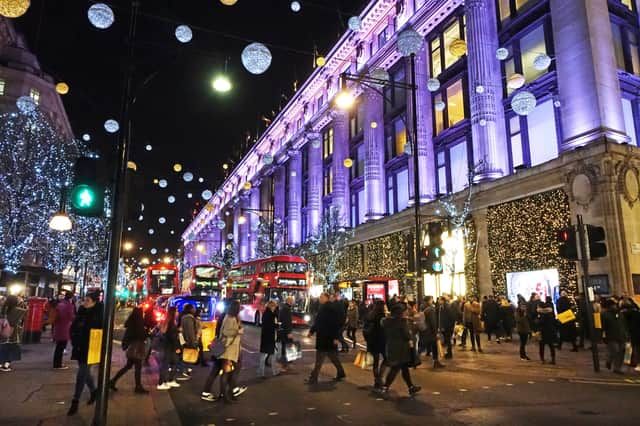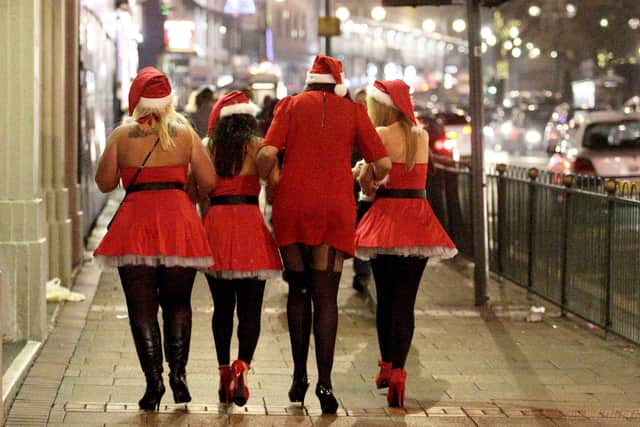Research reveals 'festive fatigue' kicked in on December 19


Research among 2,000 people who celebrate Yuletide found 52 per cent are running out of Christmas cheer by December 19.
By this point, respondents have typically been to two parties, two lunches and slogged through four shopping trips.
Advertisement
Hide AdAdvertisement
Hide AdWhile 21 per cent have watched at least two Nativity plays, and 21 per cent have already welcomed the in-laws around – but 40 per cent have hardly had any time to look after themselves as they shift focus to thinking about loved ones.
The research commissioned by Specsavers, which has named today ‘Yule Tired Day’, also found social obligations and long overdue catch ups take over, leaving 35 per cent behind on their Christmas shopping and 31 per cent yet to send any Christmas cards.
However, for 40 per cent, the festivities officially start to take their toll when they take their foot off the gas at work.
And many admit they are trying to hide their fatigue in their job, with 18 per cent opting to work remotely, 11 per cent turning their camera off during video calls, and 10 per cent choosing to hide behind their glasses to mask their bleary eyes.
Advertisement
Hide AdAdvertisement
Hide Ad

An exhausted nation
Shopping for presents (42 per cent), cleaning the house ready to welcome people over (36 per cent) and preparing Christmas dinner (29 per cent) were among the things considered most tiring.
While travelling to visit family (23 per cent), work Christmas parties (13 per cent) and hosting the in-laws (11 per cent) also made the list.
But as a result of their busy December calendar, 47 per cent revealed they find it more exhausting than any other month, and 27 per cent are having to turn down social plans throughout the month due to how hectic their schedule already is, while 27 per cent will even be trying to avoid social gatherings in January to recover.
The research, which was conducted via OnePoll, found 57 per cent feel their eyes are the biggest give away when they’re feeling tired. Headaches (30 per cent), sore, itchy eyes (21 per cent) and difficulty focusing (15 per cent) were also among the symptoms people experience during the busy festive season.
Advertisement
Hide AdAdvertisement
Hide AdDirector of Clinical Services, Giles Edmonds, at Specsavers said: “December is a busy time of year with lots of social festivities to cram in, so it’s no wonder that by the middle of the month, people are starting to feel the effects. The combination of holiday preparations, year-end work deadlines, and festive gatherings can take a toll on energy levels. For many, the eyes are also the biggest giveaway that they’re not feeling 100 per cent, so people might be trying to hide their tiredness with glasses if they wear them - or even sunglasses.
“Late-night celebrations, coupled with our use of screens for work or to watch Christmas telly can contribute to eye fatigue, making it particularly important to look after your eyes during this time.”
Expert tips to prevent eye strain over the festive period
Causes of eye strain over Christmas
- Driving for long periods to visit loved ones
- Increased stress levels and fatigue
- Straining eyes to watch the TV
- Exposure to bright festive lights
Tips to reduce symptoms such as headaches, itchy eyes, increased light sensitivity and even blurred or double vision
20:20:20 Rule
A technique recommended for all screen users - take a small break every 20 minutes to focus your eyes on something 20 feet away, for at least 20 seconds. This will help your eye muscles relax and reduce the likelihood of digital eye strain.
Contact Lenses
To ensure eyes are kept safe and healthy, lens wearers should insert their lenses before putting on makeup and remember to take them out before removing make up after a night out. Avoid make up that includes powdery or metallic eyeshadow and mascara with fibres, as the particles can get into your lenses and cause damage to your eye.
Advertisement
Hide AdAdvertisement
Hide AdDry Eyes
Take a break from wearing your lenses or change to a different lens material. You could also use contact lens‑friendly dry eye drops onto your lenses before you apply them each day to help relieve symptoms.
Red Eyes
Whilst red eyes can be alarming, there can be a wide number of causes for this – including simply increased levels of tiredness over the festive period. You can try eye drops for more immediate relief, but if this doesn’t work or the redness is more severe you should contact your optician.
Comment Guidelines
National World encourages reader discussion on our stories. User feedback, insights and back-and-forth exchanges add a rich layer of context to reporting. Please review our Community Guidelines before commenting.